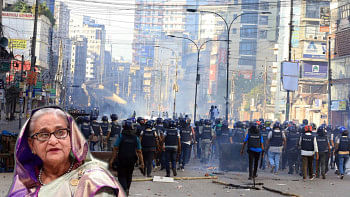Climate change and fire risks: Lessons from Southern California for Bangladesh

Addressing the intricate relationship between fire incidents and climate change is increasingly crucial, particularly in vulnerable regions like Bangladesh, which faces escalating threats from climate-related events. The alarming rise in global temperatures has been directly linked to a surge in the frequency and intensity of wildfires, illustrating a clear connection between climate instability and fire risks. For instance, the devastating wildfires that swept through Southern California in 2025 serve as a stark reminder of how prolonged drought, extreme heat, and strong winds can combine to create catastrophic fire conditions. These events not only result in the significant destruction of homes and ecosystems but also highlight the urgent need for countries like Bangladesh to understand and prepare for similar outcomes.
As climate change continues to unravel, the impacts become more pronounced, particularly through altered weather patterns that exacerbate fire risks. Rising temperatures lead to prolonged dry spells, which, in turn, dry out vegetation and increase flammability, creating an environment conducive to fire outbreaks. The 2025 Southern California wildfires exemplified how erratic precipitation, coupled with extreme heat, can generate conditions ripe for wildfires, resulting in extensive property and wildlife losses. These patterns are not unique to California; they are increasingly relevant to Bangladesh, where altered rainfall and rising temperatures threaten local ecosystems and agricultural productivity, both of which are vital for food security and economic stability. Other factors, such as rapid urbanisation, deforestation, and unsustainable agricultural practices, could exacerbate this growing threat.
The catastrophic experiences from Southern California serve as a cautionary tale; communities that lacked preparedness faced devastating losses. Similarly, many rural communities in Bangladesh are ill-equipped to handle fire outbreaks, hindered by socio-economic vulnerabilities and limited resources. Effective fire management is further complicated by numerous challenges that Bangladesh faces, including limited resources and inadequate infrastructure. The absence of comprehensive fire management policies and trained personnel severely hampers timely responses to fire outbreaks. The 2025 wildfires in Southern California underscored the importance of having well-trained firefighting teams and readily available resources for rapid response. In contrast, Bangladesh suffers from a general lack of awareness regarding fire risks and prevention strategies, leaving communities vulnerable and emphasising an urgent need for education and capacity-building initiatives.
To enhance resilience against fire risks in the context of climate change, Bangladesh must adopt integrated disaster management strategies that encompass community engagement and education programmes aimed at raising awareness about fire prevention and response. The US has successfully implemented community-based programmes that encourage local residents to become active participants in fire prevention efforts; such initiatives could serve as valuable models for Bangladesh. Additionally, promoting sustainable land-use practices, such as agroforestry and controlled burning, can mitigate fire risks while simultaneously supporting local livelihoods. Governance plays a crucial role in addressing the intertwined challenges of climate change and fire management in Bangladesh.
The wildfires in Southern California demonstrated the necessity of having clear policies and emergency response plans that can be activated during fire outbreaks. Bangladesh must strengthen its policies related to climate adaptation and disaster risk reduction, ensuring these policies are comprehensive and responsive to local needs. Encouraging stakeholder participation at all levels of governance can lead to more effective fire management strategies. Moreover, international collaboration is pivotal in enhancing fire management strategies in Bangladesh. Engaging with global organisations and neighbouring countries can facilitate the exchange of knowledge, resources, and best practices in fire prevention and response. Several developed global countries often collaborate with their international partners for wildfire management, sharing technology and strategies that have proven effective; Bangladesh could greatly benefit from similar partnerships. These collaborations would strengthen Bangladesh's capacity to manage fire incidents effectively and contribute to a more resilient future in the face of climate change.
The urgency of addressing fire risks in the context of climate change in Bangladesh cannot be overstated. As the climate continues to evolve, proactive measures must be prioritised to build resilience within vulnerable communities. The lessons learned from the 2025 Southern California wildfire season, particularly the importance of preparedness, community engagement, and sustainable practices, are critical for Bangladesh. By fostering a culture of preparedness and adaptation, the country can safeguard its environment, protect livelihoods, and enhance the well-being of its people amidst an increasingly uncertain climate landscape.
To reiterate, the interconnected challenges posed by climate change and rising fire risks present a complex dilemma for Bangladesh. The need for comprehensive and integrative strategies that encompass education, policy reform, community engagement, and international cooperation is paramount. As global temperatures continue to rise, and as we witness the consequences of extreme weather patterns, Bangladesh must take proactive steps to mitigate the potential fire risks by fostering resilience at all levels of society. The experiences from regions like Southern California provide valuable lessons that can aid in shaping effective fire management strategies tailored to the unique circumstances faced by Bangladesh. Through concerted efforts in education, policy enhancement, and collaborative initiatives, the country can better prepare for the challenges posed by climate change while protecting its vulnerable communities and natural resources.
Md Ayatullah Khan is doctoral researcher in Department of Geography at Hong Kong Baptist University, Kowloon Tong, Hong Kong.
Views expressed in this article are the authors' own.
Follow The Daily Star Opinion on Facebook for the latest opinions, commentaries, and analyses by experts and professionals. To contribute your article or letter to The Daily Star Opinion, see our submission guidelines.

 For all latest news, follow The Daily Star's Google News channel.
For all latest news, follow The Daily Star's Google News channel. 










Comments